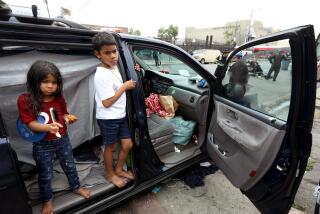Children Learn Hard Lesson in Give and Take
- Share via
The students at Sheenway School and Culture Center learned a hard lesson when they reached out to help a homeless family.
Sheenway is a private school in Watts, started by a black doctor who believed that the resurrection of a ghetto community depends on what its people do for themselves and the quality of education afforded its children.
Its 58 students are not rich, and their parents must struggle to come up with the $56 weekly tuition. The children are encouraged to be involved with the world around them, which is how, during a current-events class last summer, they decided to “adopt” Segura Williams and his family.
The Williams family was living at the Los Angeles “Tent City,” an ugly, temporary campground set up for the homeless during the summer. The Times had written about Segura, a 13-year-old who organized several of the camp’s children to seek donations of food and money.
The boy had been living in a car with eight brothers and sisters, four cousins and a mother who said they had fled the children’s abusive father in Louisiana.
The students in Watts told Dolores Sheen, the school’s director and daughter of the founder, that they would raise the tuition for each of the homeless school-age children through bake or rummage sales and car washes.
Sheen said she endorsed their project because “the only way you can teach children is to let them walk through things. You can’t preach, give parables.” She agreed to let the Williams family live in a vacant house on the school’s property.
What happened after that was “not a pretty story,” Sheen said. The Williams family stayed about six months before leaving in February. While they were there they “kept moving people in the house,” she said. “The last count was 23 people.”
The students gave up Saturdays to raise the tuition money, and came up with $260. Segura and his brothers and sisters never helped them, Sheen said.
The school, always in financial straits, got about $2,000 more from outside donations, but had to absorb more than $6,000 in tuition costs, Sheen said.
Meanwhile, others who had read about Segura also reached out to him and his family, a phenomenon reporters see all the time--deserved or not--when people get media attention. The family members got a car, clothing, even sets of colored contact lenses. Someone offered the mother’s male companion a job, Sheen said, but he turned it down.
The rock group Chicago sent them tickets and a limousine to transport them to a local concert.
Usually, the Sheenway children observed but never shared in the gifts. A handful did get to attend the Chicago concert, although they traveled separately. When they saw each other at the event, the once-homeless children “didn’t even speak to the kids,” Sheen said. “It bothered me.”
Neighbors complained about garbage flowing from the house, and finally Sheen told the mother that there were too many people there. The family departed, without so much as a thank you. They left the house in shambles, Sheen said.
That is how the children came to learn a lesson about giving, and how, as Sheen said, “some of these people are street-wise, and they take advantage.”
“I have good feelings and bad feelings,” 10-year-old Selah Gavin, a fifth-grader, said recently when asked about the experience.
“The good feelings are that we got to know them well,” she explained, meaning the Williams children. “We became friends. The bad feelings are from what they did.”
Tanisha Thompson, also 10, corrected her. “It wasn’t the children,” she said. “It was the adults.”
The walls of the school are lined with pictures of famous black achievers, and two of Segura’s portraits--of Martin Luther King Jr. and Jackie Robinson--are still displayed.
“He was very talented,” Sheen said, shaking her head. “He had so much potential.”
Selah Gavin was sure the school had helped him. “He wasn’t disciplined when he came. He was cursing,” she said. “But like he grew with the school. He understood he wasn’t supposed to curse and things like that, and he stopped.”
Would they ever help anyone again? Yes, they said. “You just can’t say, ‘Oh, they’re homeless, they’re like the Williams family so we shouldn’t help them,’ ” said Tanisha Thompson. “I feel sad when I see people on the streets.”
But next time, she added, “We would want to help them, if they’re going to help themselves.”
More to Read
Sign up for Essential California
The most important California stories and recommendations in your inbox every morning.
You may occasionally receive promotional content from the Los Angeles Times.













